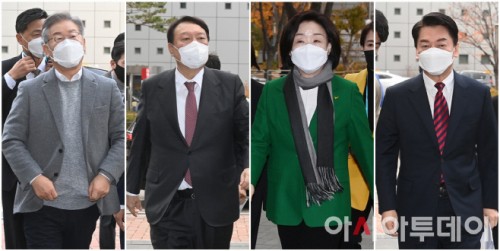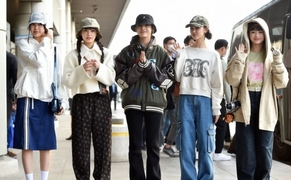 |
| (From left) Lee Jae-myung of the ruling Democratic Party (DP), Yoon Seok-youl of the main opposition People Power Party (PPP), Sim Sang-jung of the progressive Justice Party, and Ahn Cheol-soo of the minor opposition People’s Party. /Source: Joint Press Corps |
AsiaToday reporter Lee Wook-jae
Presidential candidates from the two major political parties have shown opposite reactions to the enforcement of the so-called “Nth room prevention law”, which aims to block the distribution of illegal sexual digital content on internet platforms. The ruling Democratic Party (DP) is advocating for the enforcement while the main opposition People’s Power Party (PPP) is seeking to amend the related laws claiming that it gives ‘fears of censorship.’
A legislative revision to the Telecommunications Business Act went into effect last Friday, requiring internet platforms with yearly sales of 1 billion won ($848,800) or those with more than 100,000 daily users to engage in removing illegal content from their servers. The revision was nicknamed the Nth room prevention law after a high-profile sexual criminal case which targeted teenagers and females, involving spreading and selling of sexually exploitative videos via online chatrooms on Telegram.
The presidential candidates showed conflicting reactions over the enforcement of the law, igniting a battle within the political circles.
“Many have denounced the law for being censorship, but I don’t think of it that way,” Lee Jae-myung of the ruling party said in a meeting with college students last Saturday. “Freedom of speech and freedom of press are good, but all cases of freedom and rights have limits. Once agreed, it must be followed,” he said.
The progressive Justice Party claims that the Nth room prevention law should be further strengthened. “Due to the nature of sexually exploitative videos, you cannot restore them once they are distributed. It is right to further strengthen internet platforms’ responsibility to prevent distribution of such videos, even if there are some trials and errors,” said Sim Sang-jung, the party’s presidential candidate.
On the other hand, the PPP argues that the law should be revised as it may infringe on other rights of the people. “The Nth room prevention law lacks the ability to prevent another Nth room crime, but it gives fears of censorship to the absolute majority of innocent people,” said PPP candidate Yoon Seok-youl. “The possibility of breach of communication secrets is a problem that should be taken seriously in liberal democracies,” he said.
“The bill that does not effectively regulate Telegram, which was at the center of the Nth room crime, while imposing regulations only on domestic operators should be realistically changed through re-revision,” said PPP leader Lee Jun-seok.
Rep. Ha Tae-kyung called for revision of the law during an emergency meeting. “The law is enforced based on the view that there is a problem with uploaded contents,” Ha said. “Such pre-censorship is unprecedented. It must be amended,” he added.
Ahn Cheol-soo, the presidential candidate of the minor opposition People’s Party, revealed that he sees the law as ‘People’s surveillance act’. He agreed with the PPP’s claim that it violates the confidentiality of communications pursued by Article 18 of the Constitution. “The law that censors the entire nation in advance should be completely abolished immediately,” Ahn said.
#Nth room prevention law #Yoon Seok-youl #Lee Jae-myung #People Power Party #Democratic Party
Copyright by Asiatoday
Most Read
-
1
-
2
-
3
-
4
-
5
-
6
-
7





















